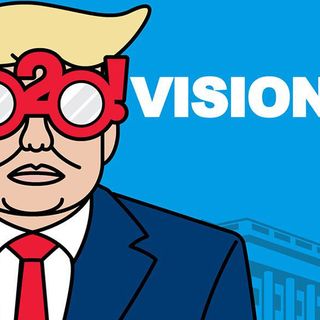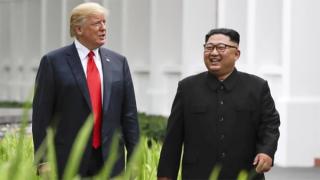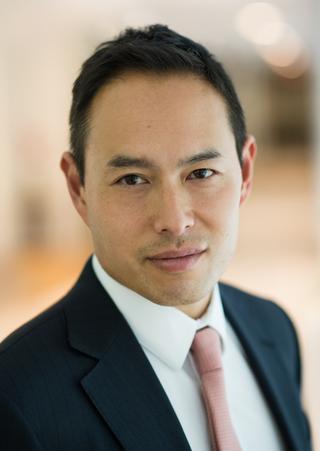When Donald Trump sits down to talk to Kim Jong-un tomorrow, it will be the second meeting between a US leader who touts himself as a master negotiator against the young leader of a totalitarian state that has outfoxed its Chinese ally and US rival for decades.
There is every reason to believe the young Kim has carefully studied and mastered the lessons of deceptive statecraft practised by his father Kim Jong-il and grandfather Kim Il-sung. If Trump wants to avoid disappointment that would result in the eventof a deeply flawed deal, these are the Kim Dynasty tricks of the trade that he should keep in mind.
First, Pyongyang is a master at getting something meaningful from the US and giving up something less meaningful or even meaningless in return.
Consider Pyongyang’s unilateral decision to destroy the Punggye-ri nuclear testing site one month before the summit last June.That created international speculation North Korea might well be serious after decades of insincerity. In fact, the site had already been used for several nuclear tests and most experts subsequently concluded that no more such tests were necessary.Kim was making a show of destroying a part of his illegal nuclear program he no longer needed.
2020Vision: The Trump & Kim Show

Although the White House was not fooled by that empty gesture, real leverage was lost following the Singapore meeting. In return for the suspension of US-South Korea military exercises that were to have begun that August, Kim did not give up anything of note. Pyongyang did not commit to any concrete denuclearisation measures or give any solid commitment to cease the developmentof its nuclear and missile programs.
There was not even a promise to release a verifiable inventory of its illegal weapons and delivery systems. Kim knew that in the absence of that information, discussing practical steps towards denuclearisation would be impossible as the US could not even be sure what arsenal and capabilities Pyongyang possessed.
Second, in addition to giving up facilities and capabilities that North Korea no longer needs, Pyongyang is adept at asking for something valuable now in return for promising not to do something in the future. Rarely will Pyongyang offer to give up something of worth that it already has. In the schoolyard, this is like the bully promising not to punch you in the face tomorrow in return for your pocket money today.
Bear in mind Kim has become the first North Korea leader to meet the serving US president. Since the Singapore summit, China and Russia have relaxed enforcement of UN Security Council sanctions against North Korea and endured only minimal US opprobrium for doing so. What has Trump pointed to as progress in return? The offering that North Korea has not tested any nuclear bomb or launched any missiles since Singapore.
Pyongyang is a master at getting something meaningful from the US and giving up something less meaningful or even meaningless in return.
The claim is true, but its value is significantly diminished given Pyongyang conducted its sixth nuclear test and fired at least 23 test missiles in 2017 alone, meaning it is close to where it wants to be in terms of weapons capabilities.
Third, Pyongyang always leaves wriggle room when it comes to defining its commitments. Kim promised to work towards “complete denuclearisation of the Korean peninsula” in the Singapore joint statement.
That phrase leaves open the North Korean demand that US troops leave South Korea and the removal of US bombers and submarines from the surrounding region. That would be an enormous strategic victory for North Korea, China and Russia.
Fourth, Pyongyang knows how to cheat even when it is ostensibly abiding by the terms of its commitments. For example, as part of the 1994 Agreed Framework, North Korea promised to dismantle its reactor at Yongbyon, which was used to produce plutonium.
In return, it would receive fuel oil paid for by the US and assistance to construct two civilian light-water nuclear power stations. The framework was terminated nine years later when it emerged North Korea was secretly working towards a uranium version of a nuclear bomb.
And, finally, when a stalemate suits the Hermit Kingdom, Pyongyang is adept at using disagreement about sequencing as the bottleneck. Kim insists on maintaining and developing his nuclear-capable missile facilities until the US declares a formal end to hostilities in the form of a peace treaty and officially winds back UN Security Council and unilateral sanctions against North Korea. Pyongyang knew all along that Washington would demand the reverse sequencing.
Nothing is ever truly hopeless. Trump should be given credit for focusing so much of his presidency on dealing with the North Korea nuclear threat. He has created more apprehension in Pyongyang, Beijing and Moscow — the latter two acting as a lifeline for the Kim regime — than any other president and has changed calculations in those capitals. Trump’s maximum pressure campaign, which includes UN Security Council sanctions, remains formally in place.
In his second meeting with Kim tomorrow, Trump should remember this piece of common wisdom: fool me once, shame on you; fool me twice, shame on me.






